(1) GOOD NEWS. My mother is back to her usual self and physically has regained enough ground for the doctor to send her home to the skilled nursing facility where she lives. She’ll go back tonight. And it’s hard to break the Scroll habit when I have a couple hours left to work on one!
(2) A LEADER WHO LOOKS TO THE FUTURE. [Item by Danny Sichel.] As a result of the October 3 election, Wab Kinew of Manitoba — winner of the 2022 Aurora Award for Best Young Adult Novel, for his Walking in Two Worlds — has joined the late Julius Vogel of New Zealand in a very exclusive club: SFF authors who are also heads of government. “Wab Kinew becomes Canada’s 1st First Nations premier of a province” CBC Kid News.
(3) FUTURE TENSE. The September entry in the Future Tense Fiction series: is“Little Assistance,” about the first judge on the Moon, by Stephen Harrison, a Slate columnist and lawyer.
The other homesteaders, mostly engineers and technicians, seemed to enjoy outings in the lunar rover. “Joyrides,” they called them. But for Eugene, this was a grinding chore that frayed his nerves. As he trundled across the powdery surface, he recounted a litany of risks: razor-sharp regolith puncturing the tires, a power failure in his EVA suit, a freak meteor hurtling through the chassis …
It was published along with a response essay, “Space law: The commercialization of space is here. International law isn’t prepared” by space law expert Saskia Vermeylen.
(4) A YANK AT OXFORD. Connie Willis has been across the Pond again: “England 2023 – Oxford, Part 1”.
Just got back from a research trip to England. It was great, even though Oxford was experiencing a terrible heat wave, so hot the tour guides were telling people NOT to take the walking tours but to instead go inside one of the museums (even though those weren’t air-conditioned either).
We spent a lot of time in the History of Science Museum, which is most famous for having Einstein’s blackboard, but also has Lawrence of Arabia’s camera, Lewis Carroll’s photographic equipment, and the actual penicillin specimen that Florey and his team worked with when developing the drug during World War II.
Alexander Fleming was the one who’d originally discovered penicillin, but he’d never been able to do anything with it, and it was Howard Florey, Ernst Chain, Margaret Jennings, and other Oxford scientists who developed it into a practical medicine and the “miracle drug” that saved millions of lives during the war, using bedpans and every other container they could find to grow the vast quantities of penicillin needed….
(5) GENIUS GRANTS. The 2023 MacArthur Fellows were announced to me. The descriptions did not indicate to me that any of them have genre connections. Perhaps you will have better luck spotting some.
(6) CROWDFUNDING APPEAL. Fan and former Worldcon chair (1983) Michael Walsh has started a GoFundMe for “Car repair and storage”.
Over the weekend my car died. Got it to the dealer. New battery, starter, and alternator need to be replaced. Doing that leaves no money until mid month.
(7) MOSLEY AND OATES. Andrew Porter took these photos of Walter Mosley and Joyce Carol Oates being interviewed at St. Ann’s Church, Brooklyn Heights, during last weekend’s Brooklyn Book Festival. (You can also see more photos in the Brownstoner’s article about “Literary Crowds at the Brooklyn Book Festival”.)
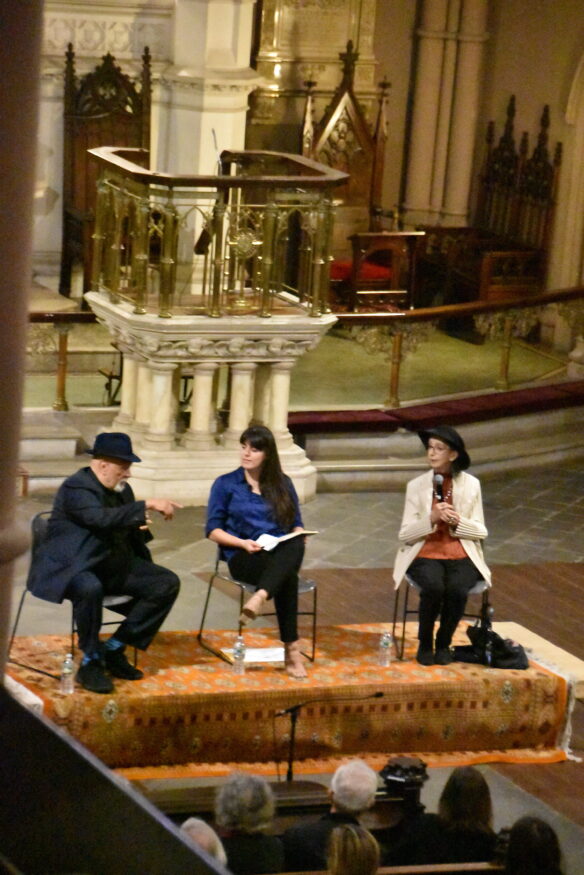
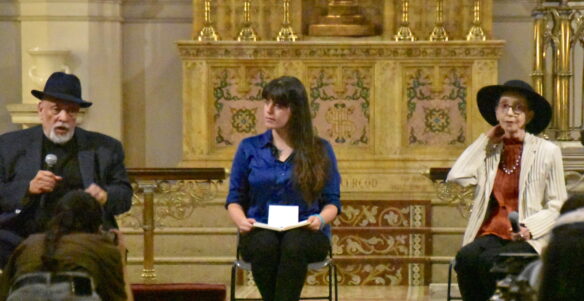
At the Festival, Porter also spotted a copy of this book with its tribute to my friend, the late Fred Patten (1940-2018).
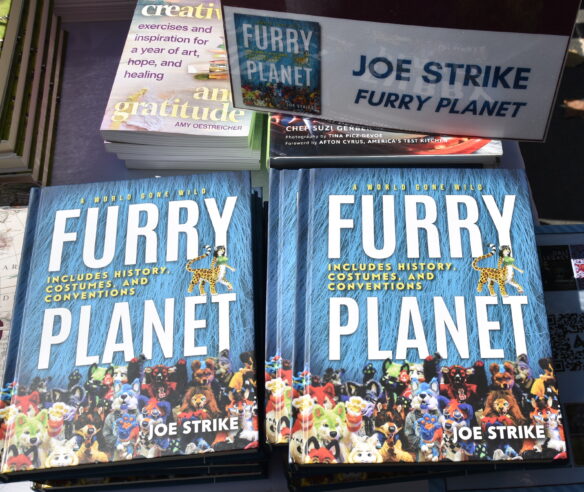
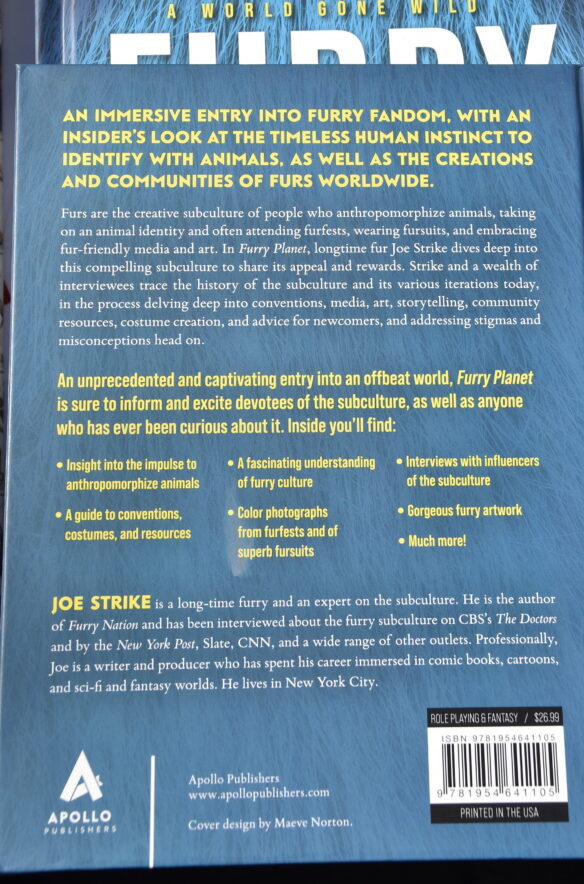
(8) BY KLONO’S BRAZEN BALLS. Did we run this before? Not sure. But no Filer wants to miss a discussion of “How Far Afield Can Sci-Fi and Fantasy ‘Fake Swearing’ Get Before You Feel Uncomfortable?” at The Stopgap.
On the one hand, it is unlikely that three hundred years in the future, a group of space marauders (or six hundred years ago in Ruritania, or on the third 5,000-year resurrection cycle on an alternate Earth that looks suspiciously like the Dalmation Coast) is going to rely on the same profanity as twenty-first-century North Americans. But on the other hand, everything else sounds worse. Unless you’re willing to create an entirely new language with its own complex set of rules, don’t bother coming up with a ten-word vocabulary of invented oaths. The best this can sound is stupid….
(9) MEMORY LANE.
1944 — [Written by Cat Eldridge from a selection by Mike Glyer.]
Fredric Brown is the writer who offers up our Beginning this time. Despite the story that is told of his wife claiming that he hated to write, he would write four novels and somewhere in excess of a hundred short stories and quite a few poems. That really takes dedication to writing, doesn’t it?
So what do I like by him? Martians, Go Home which I think is one of the finest comical SF novels ever done, and I realized that I’d read What Mad Universe a long time ago, it’s quite a fun read. And what I’ve read of his short stories are quite excellent indeed.
So who has read his mysteries? They look like they could be worth an evening or two. I noticed that his first one, The Fabulous Clipjoint, won the Edgar Award for outstanding first mystery novel. Very impressive!
Our Beginning this time is that of his “Arena” short story published in the June 1944 issue of Astounding Science Fiction.
The Star Trek episode called “Arena” had similarities to his story. So who here can tell me what those were? In order to avoid legal entanglements, it was agreed that Brown would receive payment and a story credit.
It is available in the Robert Silverberg edited The Science Fiction Hall of Fame, Volume One, 1929-1964 which is available from the usual suspects.
Now our Beginning…
CARSON OPENED HIS EYES, and found himself looking upwards into a flickering blue dimness.
It was hot, and he was lying on sand, and a rock embedded in the sand was hurting his back. He rolled over to his side, off the rock, and then pushed himself up to a sitting position.
‘I’m crazy,’ he thought. ‘Crazy — or dead — or something.’ The sand was blue, bright blue. And there wasn’t any such thing as bright blue sand on Earth or any of the planets. Blue sand under a blue dome that wasn’t the sky nor yet a room, but a circumscribed area — somehow he knew it was circumscribed and finite even though he couldn’t see to the top of it.
He picked up some of the sand in his hand and let it run through his fingers. It trickled down on to his bare leg. Bare?
He was stark naked, and already his body was dripping perspiration from the enervating heat, coated blue with sand wherever sand had touched it. Elsewhere his body was white.
He thought: then this sand is really blue. If it seemed blue only because of the blue light, then I’d be blue also. But I’m white, so the sand is blue. Blue sand: there isn’t any blue sand. There isn’t any place like this place I’m in.
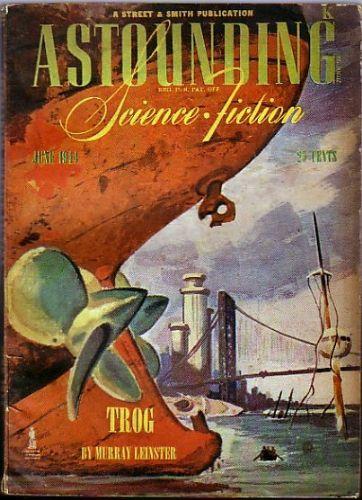
(10) TODAY’S BIRTHDAYS.
[Compiled by Cat Eldridge.]
- Born October 4, 1860 — Sidney Edward Paget. British illustrator of the Victorian era, he’s definitely known for his illustrations that accompanied Arthur Conan Doyle’s Sherlock Holmes stories such as the one in “The Adventure of Silver Blaze” which appeared in The Strand Magazine in December 1892, with the caption “Holmes game me a sketch of the events”. He also illustrated Arthur Morrison’s Martin Hewitt, Investigator, a series of short stories featuring the protagonist, Martin Hewitt, and written down by his good friend, the journalist Brett. These came out after Holmes was killed off, like many similar series. (Died 1908.)
- Born October 4, 1904 — Earl Binder. Under the pen name of Eando Binder, he and his brother Otto published SF stories. One series was about a robot named Adam Link. The first such story, published in 1939, is titled “I, Robot”. A collection by Asimov called I, Robot would be published in 1950. The name was selected by the publisher, despite Asimov’s wishes. As Eando Binder, they wrote three SF novels — Enslaved Brains, Dawn to Dusk and Lords of Creation. (Died 1966.)
- Born October 4, 1928 — Alvin Toffler. Author of Future Shock and a number of other works that almost no one will recall now. John Brunner named a most excellent novel, The Shockwave Rider, after the premise of Future Shock. (Died 2016.)
- Born October 4, 1932 — Ann Thwaite, 91. Author of AA Milne: His Life which won the Whitbread Biography of the Year, as well as The Brilliant Career of Winnie-the Pooh, a scrapbook offshoot of the Milne biography. (And yes, Pooh is genre.) In 2017 she updated her 1990 biography of A.A Milne to coincide with Goodbye Christopher Robin for which she was a consultant.
- Born October 4, 1956 — Bill Johnson. His writing was strongly influenced by South Dakota origins. This is particularly true of his “We Will Drink a Fish Together” story which won a Hugo for Best Novelette in 1998. (It got a Nebula nomination as well.) His 1999 collection, Dakota Dreamin, is quite superb. (Died 2022.)
- Born October 4, 1975 — Saladin Ahmed, 48. His Black Bolt series, with Christian Ward as the artist, won an Eisner Award for Best New Series and the graphic novel collection, Black Bolt, Volume 1: Hard Time, was a finalist at Worldcon 76 for Hugo Award for Best Graphic Story.
(11) COMICS SECTION.
- Popeye unexpectedly includes the phrase “pocket dimensions”.
- Arturo Serrano’s review of the webcomic Strange Planet and the Apple TV+ show adapted from it is titled “Trite Planet”, which is a hint at his opinion. On the other hand, the review includes numerous examples of the comic which you may like more than he does.
With the webcomic Strange Planet, first published on Instagram and then in book format, cartoonist Nathan W. Pyle has become the rare success story where a comedian has proved able to sustain a career based on knowing exactly one joke. His featureless blue aliens lead entirely ordinary lives, doing the same things humans do, but speaking with a degree of technical precision that exposes how abnormal our assumptions of normality truly are. Pyle has discovered how to milk the same gimmick a million times, creating a surprisingly caustic style of humor clothed in pastel. From innocent slice-of-life scenarios, Strange Planet can go into some really dark insights, a remarkable feat of tonal balancing without which it wouldn’t have become so explosively popular….
(12) BREAKTHROUGH UK COMICS LAUREATE. “Bobby Joseph becomes first person of colour appointed UK comics laureate” reports the Guardian.
The comic book author and graphic novelist Bobby Joseph has become the first person of colour to be appointed the UK’s comics laureate.
Joseph, who was one of the first authors to create a British comic with black characters, was appointed to the role at the Lakes international comic art festival (LICAF) in Bowness-on-Windermere in the Lake District on Saturday.
He is the fifth person to hold the post, which was created in 2014 to raise awareness of the impact comics can have on increasing literacy and creativity. One of the laureate’s key focuses is to increase the acceptance of comics as a tool for learning in schools and libraries.
Joseph, 51, who grew up in south London, told the Guardian he hoped to spend his two-year stint tackling the lack of diversity in the comics industry.
“This award is a huge achievement. I am very honoured to get it. That said, one of the key things I want to do is change things with regards to diversity, representation and the unheard voices of comics. This is my main focus. There is no point being in this role unless I am able to help others,” he said….
(13) ABOUT THAT DAY JOB. Publishers Weekly has the numbers to prove that “Writing Books Remains a Tough Way to Make a Living”.
A new author income study released by the Authors Guild provides a dizzying array of numbers and breakdowns about how all types of authors—traditionally published and self-published, full-time and part-time—fared financially in 2022. With such a deep trove of statistics, the survey offers something for everyone, but the main takeaway is that most authors have a hard time earning a living from their craft.
The survey, which drew responses from 5,699 published authors, found that in 2022, their median gross pre-tax income from their books was $2,000. When combined with other writing-related income, the total annual median income was $5,000. The median book-related income for survey respondents in 2022 was up 9% from 2018, adjusted for inflation, with all the increase coming from full-time authors, whose income was up 20%, compared to a 4% decline for part-time authors….
(14) SNAPPING THE SUSPENDERS OF DISBELIEF. Camestros Felapton does a pretty entertaining review of the movie in “Review: 65”.
…”But…” you might say and sure there is a lot we could nitpick about the setup but that would be a category error. If you are choosing to watch this film, you are choosing to watch Adam Driver shoot dinosaurs with a hi-tech gun. “But why is he flying into this solar system if he is flying these people to a completely different planet somewhere else?” is not a legitimate question. The film comes pre-exempt from such criticism just as you can’t ask a rom-com to not depend so much on random coincidences or misunderstandings, or why cars are so prone to exploding in an action movie, or what the actual murder rate was among wealthy British people in a period murder mystery….
[Thanks to Ersatz Culture, John King Tarpinian, Chris Barkley, Sean Wallace, Lise Andreasen, Daniel Dern, Olav Rokne, Danny SIchel, Bill, Cat Eldridge, SF Concatenation’s Jonathan Cowie, Mike Kennedy, and Andrew Porter for some of these stories. Title credit belongs to File 770 contributing editor of the day Daniel Dern.]


